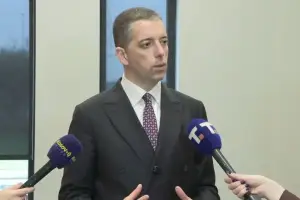Minister of Justice Nenad Vujić today presented the Republic of Serbia’s strong criticism of the work of the International Residual Mechanism for Criminal Tribunals in The Hague (the Mechanism) to the members of the United Nations Security Council.
- Serbia
Get to know Serbia
- Citizens
Culture and science
Health services
Pension and disability insurance
- Business
Employment
Economy
- Media
- Government
- Contact
Keep in touch
Keepin touch
Whether you have a question, comment, suggestion or any problem in the purview of the government, send us your message and we will try to respond as soon as possible. If your problem is not in our purview, we will forward your message to the relevant institution.
Numerous shortcomings in work of International Residual Mechanism for Criminal Tribunals in The Hague
Speaking at the Security Council session in New York, during which the Mechanism’s semi-annual report was discussed, Vujić emphasised that, with the conclusion of trials for serious violations of international humanitarian law, its mandate has in practice come to an end, and that in line with Security Council positions and resolutions, the conduct of relevant judicial proceedings should now be entrusted to national jurisdictions.
He stated that Serbia gives assurances that the conditions for early or temporary release, for which it provides guarantees, will be fully respected.
The Minister pointed out that such an approach would reduce costs, ease the burden on the families of convicted individuals, create conditions for proper rehabilitation, and above all, enhance the credibility of the Mechanism as an international “authority”.
Regarding proceedings for serious violations of international humanitarian law currently before national courts, Vujić stressed that the Office of the Prosecutor of the Mechanism holds no authority over national judicial institutions.
He also noted that no person who has committed a criminal offence will be granted asylum or shelter in Serbia, and that no criminal proceedings will be initiated without sufficient evidence establishing reasonable suspicion that a criminal offence has been committed.
According to him, deficiencies in the Prosecution’s work over the past decades cannot be resolved through programmes promoting the so-called achievements of the Mechanism and the ICTY.
-
 Belgrade, 25 January 2026
Belgrade, 25 January 2026Government priorities Expo 2027, energy, education and science, health and military issues
-
 Belgrade/Istanbul, 23 January 2026
Belgrade/Istanbul, 23 January 2026Balkan Peace Platform aimed at strengthening ties in region
-
 Belgrade, 23 January 2026
Belgrade, 23 January 2026EU enlargement policy should be based primarily on merits of candidate countries
-
 Istanbul/Belgrade, 23 January 2026
Istanbul/Belgrade, 23 January 2026Improving overall cooperation between Serbia, Türkiye
-
 Belgrade, 22 January 2026
Belgrade, 22 January 2026EU is Serbia’s reliable partner in public administration reform process
-
 Belgrade, 22 January 2026
Belgrade, 22 January 2026State of emergency caused by adverse weather lifted in all municipalities, cities
-
 Belgrade, 22 January 2026
Belgrade, 22 January 2026Electricity supply in Serbia stable
-
 Belgrade/Budapest, 21 January 2026
Belgrade/Budapest, 21 January 2026Belgrade-Budapest high-speed rail of strategic importance for region
-
 Belgrade, 21 January 2026
Belgrade, 21 January 2026Further strengthening of economic relations with UAE
-
 Belgrade, 20 January 2026
Belgrade, 20 January 2026Significance of return of Belgian armed forces to KFOR Mission in Kosovo and Metohija

.webp)